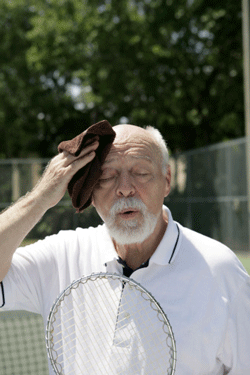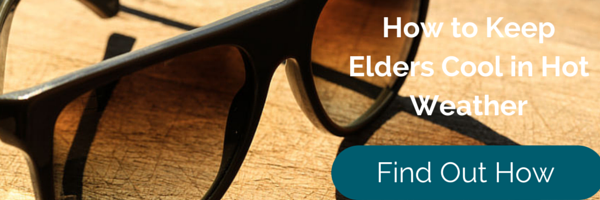 Does your summer fun melt away in the heat of the day? Do you toss and turn all night on sweat-soaked sheets for three months out of every year? If you are an older person and find it increasingly difficult to deal with heat, you are not alone– individuals over the age of 65 are more prone to heat stress than are younger people.
Does your summer fun melt away in the heat of the day? Do you toss and turn all night on sweat-soaked sheets for three months out of every year? If you are an older person and find it increasingly difficult to deal with heat, you are not alone– individuals over the age of 65 are more prone to heat stress than are younger people.
Fortunately, there are a few simple, inexpensive tricks to making senior living much cooler.
Older adults can be at greater risk for heat-related problems because older bodies do not adjust to changes in temperatures as well as younger bodies. Plus, many seniors are also more likely to have chronic medical conditions or take medications that change the way their bodies respond to heat. These factors leave seniors at higher risk for developing heat exhaustion and heat stroke.
Seniors can prepare to stay comfortable and safe, even in the hottest summer months, with a few cool senior living tips.
Cooler Senior Living Outdoors
Plan to do outdoor activities in the early hours of the morning, before the heat of the day sets in. Eat breakfast outdoors, for example, but go inside for lunch and dinner.
Play in the shade. Sun exposure raises your body temperature and increases your risk for developing heat exhaustion or, worse yet, heat stroke. Enjoy activities inside a covered porch or under a tree.
Slow down. Avoid strenuous activity, which increases your risk for developing heat exhaustion. The faster you move, the more your body heats up so take it easy during hot weather. Take frequent breaks– sit down and enjoy a glass of cool water or lemonade.
Summer is best enjoyed at a relaxed pace anyway.
Cooler Senior Living Indoors
Lower the shades to keep out sun and heat. Get a head start on the sun by closing the shades on the east side of your house in the morning and shutting the southern and western shades in the afternoon and evening. Invest in sun-blocking blinds that still allow air to flow through open windows.
Open the windows, especially at night. Use box fans to blow cool air into a room.
Turn on that air conditioner– it does you no good just sitting there, blocking your view through the window. If you avoid turning on the AC because you are concerned about your electric bill, replace old air conditioner units with newer, more efficient models. Those of you with central air can look into replacing your outdoor compressor with a high-efficiency unit.
Cooler Senior Living Anywhere
Drink plenty of water, juice and sports drinks to keep your body hydrated. Avoid caffeine– it can act as a diuretic that makes you urinate more often, increasing your risk for dehydration.
Eat small meals several times a day, especially if you tend to lose your appetite in hot weather. Nibble on cold foods like sandwiches and salads— fruits and vegetables are rich in nutrients and contain lots of water to keep you hydrated.
Indulge in cool treats such as popsicles, ice cream and yogurt. Sugar-free versions are available if you worry about your blood sugar levels.
Update your style– wear lightweight, loose-fitting clothing. Light colors are best, as are clothes made from cotton. Protect your skin with UV sun block and a wide brimmed hat for daylight excursions outdoors. Don’t look good in a hat? Use an umbrella instead.
Learn to recognize the signs and symptoms of heat exhaustion and heat stroke; take immediate action if you or someone else experiences signs of these serious conditions. Give a person something to drink and ask him to sit down if he shows signs of heat exhaustion:
- cool, moist, pale, flushed or red skin
- headache
- nausea or vomiting
- heavy sweating
- dizziness and extreme fatigue
Cool the individual with a hose or wet towels and call 911 if his skin is hot, red and/or dry, he loses consciousness, has a rapid and weak pulse, and rapid, shallow breathing. Do not give him water if he refuses or vomits.
Don’t melt away in the summer sun this year. Reduce your risk for heat-related problems by incorporating these senior living tricks into your summer routine. Keep your cool this summer!












